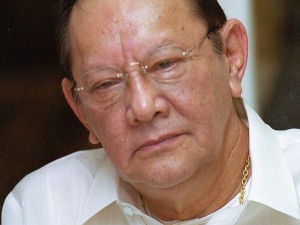MANILA — The Sandiganbayan has again thumbed down the government’s bid for an early resolution of two civil cases to recover several companies allegedly bought by Marcos associates using coconut levy funds.
In a recent 13-page resolution, the court’s Second Division affirmed its June 2 ruling that earlier denied the request for summary judgment on Civil Cases Nos. 33-B and 33-D
The denial of the summary judgment plea means the cases will still have to go to trial nearly 30 years since the parent suit Civil Case No. 33 was filed in July 1987.
The court said the defendants, including businessman Eduardo Cojuangco Jr. and former Senator Juan Ponce Enrile, raised arguments that “can only be resolved in a full-blown trial” and not by cutting the proceedings short.
Civil Case No. 33-B concerned the disputed ownership of Cocofed Marketing Corp. (Cocomark) and United Coconut Planters Life Assurance Corp. (Cocolife).
Meanwhile, 33-D covered the companies created through the Coconut Industry Investment Fund (CIIF), including United Coconut Oil Mills (Unicom) and 16 other mills.
The government, represented by the Presidential Commission on Good Government and the Office of the Solicitor General, said four Supreme Court rulings from 2012 to 2015 have declared coconut levy funds to be public funds.
They argued these rulings have warranted the reconveyance of the companies by virtue of a summary judgment, believing that the public nature of the companies was established already.
But the court disagreed with this contention and said the Supreme Court actually declared the coconut levy funds to be merely “prima facie” public funds.
Since coconut levy proceeds are considered public funds only at first impression, their character would still have to be subject to a “rebuttal or contradictory evidence,” according to the Sandiganbayan.
The court said it could not simply order the reconveyance of the companies to the government “when the defendants made denials of the plaintiff’s material allegations and correspondingly raised genuine issues on the matter.”
Among the issues raised by Cojuangco are questions on whether the companies were really bought with coconut levy funds, whether the defendants are their beneficial owners, and whether a coconut monopoly was established by acquiring the mills.
According to the court, the government is required to address Cojuangco’s issues by presenting evidence to show the companies did not become legitimately private.
“A summary judgment can be rendered only when there are no questions of fact in issue or where the material allegations of the pleading are not disputed,” read the resolution penned by Justice Michael Frederick L. Musngi.
Justices Oscar C. Herrera Jr. and Zaldy Y. Trespeses concurred with the resolution. SFM
